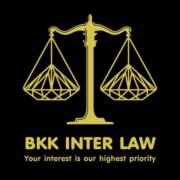Best Private Equity Lawyers in Don Mueang
Share your needs with us, get contacted by law firms.
Free. Takes 2 min.
List of the best lawyers in Don Mueang, Thailand
Thailand Private Equity Legal Questions answered by Lawyers
Browse our 1 legal question about Private Equity in Thailand and read the lawyer answers, or ask your own questions for free.
- Land dispute
- My wife and I bought land from her aunt during COVID, when we lived in England. So we put the land in her mother's name, because we could not travel due to COVID. We moved to Thailand 10 months ago and have recently found out that my mother-in-law had finance... Read more →
-
Lawyer answer by C.P. LAW BUSINESS CONSULTANT
You can sue to recover all your property, land, or money, and also claim compensation for any damages you have suffered. If we find that all their actions constitute criminal fraud, we can prosecute them.
Read full answer
About Private Equity Law in Don Mueang, Thailand
Private equity involves investment funds that acquire equity ownership in private companies or take public companies private with the aim of restructuring or growing these businesses before selling them for a profit. In Don Mueang, a district in northern Bangkok, private equity transactions often involve both local and international investors. The area is experiencing increasing economic activity, including growth in real estate, aviation, and logistics sectors, making it a favorable location for private equity ventures. Thai laws and regulations require careful planning and compliance for both foreign and domestic participants in the private equity market.
Why You May Need a Lawyer
Private equity investments and transactions can be complex, involving significant legal and financial considerations. Individuals and companies may need a lawyer in situations such as:
- Structuring a private equity fund or investment vehicle
- Conducting due diligence on potential investments or partners
- Negotiating and drafting shareholder agreements or partnership contracts
- Ensuring compliance with Thai regulations and foreign investment restrictions
- Navigating issues related to mergers, acquisitions, or divestitures
- Resolving disputes among investors or with management
- Understanding tax implications and structuring the transaction accordingly
- Protecting intellectual property and proprietary interests in acquired businesses
- Dealing with cross-border investment regulations, especially for foreign investors
Local Laws Overview
Private equity deals in Don Mueang, as in the rest of Thailand, are governed by several key statutes and regulations. The Foreign Business Act regulates the extent of foreign ownership permitted in Thai companies. The Securities and Exchange Commission (SEC) of Thailand oversees fund registration and certain types of private equity activities. Due diligence is essential to ensure compliance with anti-money laundering (AML) requirements, tax laws, and transfer pricing rules. Employment laws, real estate regulations, and sector-specific licensing may also impact private equity transactions, especially in regulated industries like aviation or real estate development common in Don Mueang.
Privacy, data protection, and electronic transaction regulations may be relevant when acquiring or investing in tech-focused businesses. It is crucial to undertake proper due diligence and structuring to comply with both local and national legal requirements.
Frequently Asked Questions
What is the typical process for a private equity investment in Don Mueang?
The process usually starts with identifying a target company, followed by due diligence, negotiation of terms, drafting legal agreements, closing the deal, and ongoing management until exit. Local regulatory compliance should be observed at each stage.
Are there restrictions on foreign investors in private equity in Don Mueang?
Yes, the Foreign Business Act restricts foreign ownership in certain sectors. Approvals or structures such as joint ventures may be required to remain within legal limits.
What taxes apply to private equity transactions?
Investors need to consider corporate income tax, capital gains tax, withholding tax, stamp duties, and VAT, depending on the transaction and structure.
How is due diligence conducted for private equity in Don Mueang?
Due diligence involves reviewing legal, financial, operational, and compliance aspects of the target business, including its licenses, contracts, intellectual property, and litigation history.
Is government approval required for all private equity deals?
Not all deals require government approval, but transactions involving foreign ownership, certain industries, or antitrust concerns may need regulatory clearance.
Can private equity investors appoint their own management in acquired companies?
Investors often negotiate for representation or control over management, but this depends on the terms agreed with other shareholders and is subject to local law.
How are disputes between investors and companies resolved?
Disputes can be resolved through negotiation, mediation, arbitration, or litigation, with the chosen method usually specified in the shareholders’ agreement.
What legal structures are commonly used for private equity in Don Mueang?
Common structures include private limited companies, partnerships, and holding companies. The choice depends on the investment type, tax considerations, and regulatory requirements.
Are there special considerations for investing in regulated sectors?
Yes, sectors like aviation, telecommunications, or real estate may require additional licenses and approvals, and may have restrictions on foreign investment.
Do private equity agreements need to be in Thai language?
While English language agreements are common, certain documents may need to be in Thai or translated for submission to government agencies or courts.
Additional Resources
Individuals seeking legal advice in private equity can access various resources, including:
- Office of the Securities and Exchange Commission (SEC) Thailand
- Department of Business Development (DBD)
- Board of Investment (BOI) Thailand
- Thai Bar Association
- Local chambers of commerce and business councils
These organizations provide regulatory guidance, investment resources, and sometimes referrals to qualified legal professionals.
Next Steps
If you are considering a private equity transaction in Don Mueang, it is wise to consult with a lawyer experienced in Thai business law. Begin by collecting relevant documents and clearly outlining your investment objectives. Contact a legal professional for a consultation to discuss your needs. They will help you assess feasibility, identify regulatory requirements, and draft or review all necessary agreements. Throughout the process, ongoing legal support is crucial to ensure compliance and to safeguard your investment.
Lawzana helps you find the best lawyers and law firms in Don Mueang through a curated and pre-screened list of qualified legal professionals. Our platform offers rankings and detailed profiles of attorneys and law firms, allowing you to compare based on practice areas, including Private Equity, experience, and client feedback.
Each profile includes a description of the firm's areas of practice, client reviews, team members and partners, year of establishment, spoken languages, office locations, contact information, social media presence, and any published articles or resources. Most firms on our platform speak English and are experienced in both local and international legal matters.
Get a quote from top-rated law firms in Don Mueang, Thailand — quickly, securely, and without unnecessary hassle.
Disclaimer:
The information provided on this page is for general informational purposes only and does not constitute legal advice. While we strive to ensure the accuracy and relevance of the content, legal information may change over time, and interpretations of the law can vary. You should always consult with a qualified legal professional for advice specific to your situation.
We disclaim all liability for actions taken or not taken based on the content of this page. If you believe any information is incorrect or outdated, please contact us, and we will review and update it where appropriate.









